#how can hiv be transmitted through
Text
youtube
How can I reduce my risk of getting HIV? #HIV #healthtips #raphacure - YouTube
🌈⚡️ Empower Yourself: Reducing Your Risk of HIV Infection! #HIVAwareness Curious about ways to minimize your risk of HIV? Empower yourself with essential knowledge and take proactive steps to protect your health. Your well-being matters, and being informed can make a significant impact. 🌈⚡️ 🧡 Practice Safe Sex: Consistently and correctly use condoms or dental dams during sexual activity, especially with new or unknown partners. This greatly reduces the risk of HIV transmission. 🚫 Avoid Sharing Needles: If you use injectable drugs, never share needles, syringes, or any equipment. Use clean, sterile supplies to reduce the risk of HIV and other infections. 💉 Consider PrEP: Pre-exposure prophylaxis (PrEP) is a medication taken daily by individuals at high risk of HIV. Consult a healthcare provider to determine if PrEP is right for you.
💪 Maintain Good Health: A healthy immune system can help protect you. Eat a balanced diet, exercise regularly, manage stress, and get sufficient sleep. 🌡️ Regular Testing: Get tested for HIV regularly, especially if you engage in high-risk behaviors. Early detection allows for prompt treatment and reduces the risk of transmission. 👥 Know Your Partner's Status: Communicate openly with your sexual partners about their HIV status and get tested together. This helps build trust and make informed decisions. 🌈 Supportive Relationships: Cultivate a network of friends and partners who prioritize safe practices and open communication about sexual health. 💬 Educate Yourself: Stay informed about HIV transmission, prevention methods, and the latest advancements in HIV awareness and care. 🙌 Community Resources: Utilize available resources, such as local health centers, NGOs, and online platforms, to access information, testing, and support. 🌆 Stay Informed: Stay connected with HIV-awareness campaigns, community initiatives, and reliable health sources to stay up-to-date on prevention strategies. Before watching the video, don't forget to SUBSCRIBE to our channel to receive many more tips and updates! For professional help and access to essential tools, download our mobile app: 📲 Android: [Link: http://bit.ly/3JACQOb] 🍏 Apple: [Link: https://apple.co/3I0QKbe] Explore more at https://www.raphacure.com/Virtual-Con... or write to [email protected]. Remember, reducing your risk of HIV involves a combination of education, responsible choices, and proactive measures. Every step you take towards HIV prevention contributes to your overall well-being. 🗣️ Spread the Awareness, Promote Health! 🗣️ Share this valuable information with your circle to raise awareness about HIV prevention. Knowledge empowers you to protect yourself and support others in their health journey. Prioritize your health, prioritize informed choices. Stay connected for more health insights and awareness. #HIVAwareness#StayProtected#PreventHIVInfection#HealthEmpowerment#StayInformed#wellbeingmatters how can i protect my partner from getting hiv?,getting tested,does pulling out reduce hiv risk?,can i get hiv if my partner is on treatment,hiv testing,how can i protect my partners?,risk,how can hiv be transmitted through kissing,how can you get hiv,how can hiv be transmitted through,can you get hiv if your partner is on medication,can hiv be transmitted through urine,can you get hiv from just sticking it in,can i infect my partner with hiv if im on arvs?
#HIVAwareness#StayProtected#PreventHIVInfection#HealthEmpowerment#StayInformed#wellbeingmatters how can i protect my partner from getting hiv?#getting tested#does pulling out reduce hiv risk?#can i get hiv if my partner is on treatment#hiv testing#how can i protect my partners?#risk#how can hiv be transmitted through kissing#how can you get hiv#how can hiv be transmitted through#can you get hiv if your partner is on medication#can hiv be transmitted through urine#can you get hiv from just sticking it in#can i infect my partner with hiv if im on arvs?#Youtube
0 notes
Note
My question about the AIDS crisis, I'm mostly asking you because like I said, I don't think I was googling the right things, so even if you could just suggest some things to google that would be more likely to get me answers, that would be really helpful.
I guess it's mostly how did AIDS (and to some extent, any STD) become so widespread? I know that it spread through sexual contact and shared blood, but can you really "six degrees of separation" (god, that sounds so flippant, but i genuinely can't think how else to describe it) a chain of sexual partners and shared needles through any two people with HIV in the entire world? Maybe it's just because I'm a bit of a hermit, but while I can understand how it was so devastating once it was already widespread, I guess I'm having trouble understanding how it got such a foothold in the first place. If the first person with HIV had happened to not have a lot of sex would the AIDS crisis never have happened?
I swear I have absolutely no judgement for people that like to have a lot of sex, maybe I just have an underestimate of the amount of sex the average person has because frankly I don't have any? So I hope this doesn't sound disrespectful or anything, it's just kind of hard for me to believe those "six degrees of separation" kind of things in general when it's not like, famous people, so the realization that theoretically any two people with the same STD, on different parts of the globe, would have this string of sexual partners connecting them almost feels like there has to be something I'm missing... But when I'm googling things like "how did HIV become so widespread" and "how do STDs spread" I'm just getting things about how you should use protection and histories of *where* HIV spread rather than answering this more specific question (probably didn't help I was trying to do this research at 1am)
I mean this as kindly as possible:
What is your proposed alternate theory as to the spread of a disease which is transmitted through contact with blood, semen (and pre-seminal fluid), rectal and vaginal fluids, and breast milk? The disease does not spread through saliva or through touch which does not involve those fluids.
There are relatively rare cases of HIV spread through accidental needle sticks - according to WebMD, there are approximately 385k accidental needle sticks among health care workers per year in the US. WHO says that .7% of the global population has HIV, so for some back-of-the-napkin math, at most, you'll have about 2,700 of those needle sticks involving someone with HIV. Since (again, according to that WebMD article on accidental needle sticks), in cases of an accidental needle stick where the patient has HIV, the health care worker only has about a 1 in 300 chance of catching it (as opposed to 1 in 3 for an unvaccinated person catching hepatitis B via accidental needle stick from an infected patient). So - nationwide - you have approximately 9 people per year catching HIV from a needle stick.
And, to be clear, that fucking sucks. However, according to the Bureau of Labor Statistics, in 2022 there were approximately 14.7 million health care workers in the US. Not all of these people have equal risk for accidental needle sticks, but there's only so much research I'm gonna do for rough math to answer an ask on Tumblr.
The average US health care worker has approximately - again, based on my back-of-the-napkin math - 0.00000544% chance of contracting HIV from an accidental needle stick. It's astronomically more likely that a random health care worker will die from tripping over an extension cord or breathing in a caustic chemical than that they will catch HIV.
The chances of getting HIV via blood transfusion before we started routinely testing for it were all but assured if you got blood from someone with HIV. Testing now is so stringent that you have about a one in two million chance of getting HIV from a transfusion. The last recorded case I could find was in 2010, and before that, it was 2002, and the 2010 case happened in part because the donor lied about his risk profile and often participated in anonymous and unprotected sex with partners of multiple genders. He really shouldn't have been accepted as a donor at all. Approximately 4.5 million Americans receive blood transfusions per year, so, like, nowadays, it is excessively unlikely, but even in the 80s, it was an edge case means of infection, not a main source of pandemic spread.
A breastfeeding parent with a detectable viral load has about a 15% chance of transmitting HIV through breast milk. Likewise, HIV can be - and was - transmitted to babies during birth because of contact with vaginal fluid or blood, but, again, these relative edge cases are not the things pandemics are made of.
I want to stress that I am not in any way minimizing the absolute tragedy of the AIDS crisis, and I am not dismissing the fact that these methods of transmission are possible and did cause significant disruption to blood banks, stress for pregnant people with HIV, and so on. They just simply are not major methods of transmission, and never were.
With all of that said... what is your proposed alternate method of transmission, with these facts in hand? What do you think happened? Genuinely, this question is so baffling to me.
I think it's important to understand that before the emergence of HIV, most of the STIs we had were at that point either considered an annoyance (warts, HPV) or were extremely easy to treat and cure (syphilis, once a death sentence, became basically a non-issue for most people in the US as long as they were getting tested relatively frequently, and most other common STIs even today can be cured with a single course or even a single dose of antibiotics).
With that in mind, a lot of people, including a lot of queer people, were having a lot of unprotected sex. For people who could become pregnant, the advent of the pill and access to legal abortion meant that they didn't have to become or stay pregnant if they didn't want to, and for cis gay men, the prevalence of antibiotics meant that the vast majority of STIs were a brief inconvenience at worst.
So allo people did one of the things that allo people (and some ace people!) love to do:
They fucked. A lot. They fucked without fear of much consequence in terms of infection, and because it was much riskier to bring someone home where you could be seen, a lot of gay men cruised, fucking in parks or in literal back alleys or the bathrooms of clubs. They worried about getting arrested or getting caught and having their names in the newspaper much more than they worried about STIs. Sex workers, including trans sex workers, fucked in cars or hotels or... wherever the money was, because survival sec work is ... survival.
So... yeah. What is your proposed alternate theory, here? I am truly baffled at what you think otherwise happened, given a disease with a very narrow route of infection.
749 notes
·
View notes
Text
(TW: Sex - educational context, HIV prevention)
My dear lgbt+ kids,
After my last post about HIV, I received multiple asks like "I feel embarrassed to ask something so stupid but..." - and the pure fact that I got multiple of them already proves that not knowing something is no reason to be embarrassed!
Many people are not super confident in their HIV knowledge. Acknowledging that and seeking more info is a great thing. I decided to put all these questions in one post:
How do you even get HIV?
Certain body fluids can transmit HIV:
blood
semen (cum)
pre-seminal fluid (pre-cum)
rectal fluids
vaginal fluids
breast milk.
Most adults who get HIV get it through sex (vaginal or anal) or sharing needles (or other drug injection equipment). Getting it from oral sex is also possible but less common.
Parent-to-child transmission (birth, breastfeeding) is the most common way that children get HIV.
Can you get HIV from topping?
Yes. Both the top and the bottom can get HIV through penetrative sex (top means you are penetrating your partner, bottom means your partner is penetrating you).
During anal sex, the bottom has a higher risk. That's because HIV can enter the body through the rectum’s thin lining. But: HIV can also enter the body through the opening at the tip of the penis or the foreskin or small cuts/scratches/sores anywhere on the penis.
During vaginal sex, either partner can get HIV as well, through vaginal tissue, the cervix or the penis as described above.
Can you get HIV from kissing?
You can’t transmit HIV through saliva, so there would need to be blood (or another fluid of the ones named above) involved. That means you could theoretically get HIV from open-mouthed kissing if both partners have sores or bleeding gums - but this is very rare.
You can’t transmit HIV at all through closed-mouthed kissing.
Can you get HIV from a public toilet?
The only realistic risk of getting HIV from a public toilet is by having sex or sharing drug equipment in there!
HIV does not survive long outside the human body (like on the toilet seat or door handle) and it cannot reproduce outside a human host. Wash your hands, as there are other germs that do survive on surfaces, but don't worry about HIV.
Can you get HIV from getting a tattoo?
You theoretically could - if the equipment or ink has someone else’s blood in it. This is unlikely to happen unless the person doing your tattoo uses unsterilized needles.
If you get a tattoo or piercing, make sure that the person doing the procedure is properly licensed and uses only new or sterilized equipment.
Can you get HIV from masturbating?
No. The only possible way would be if there were bodily fluids from an infected person on your fingers or sex toys.
It's always a good idea to wash your hands first because there could be other germs/irritants on them - but if you are doing it all alone, there is no risk of HIV. If you are masturbating together with another person, try to avoid sharing toys. If you do share them, use a new condom for each partner.
Can you get HIV from drinking alcohol?
When we talk about transmission via drug use, we are talking about sharing needles or drug equipment - they may have someone else's blood on them.
Alcohol use doesn't involve needles, you can not directly get HIV from being drunk. But: being drunk (or high) can lead to risky behavior that sober you wouldn't participate in, such as unprotected sex! It's a good idea to be careful around alcohol.
Isn't there a cure for HIV by now?
No. Once you have HIV, you have it for life - but the good news are there is treatment available! Someone who is HIV-positive and starts receiving treatment early has a normal life expectancy.
Medicine can reduce the amount of HIV in the blood (this is called viral load). In fact, it can make the viral load so low that a test can’t detect it anymore - and if you have an undetectable viral load, you will not transmit HIV to others!
With all my love,
Your Tumblr Dad
901 notes
·
View notes
Text
Babies are not props to be used to validate gender feelz. And unfortunately this is just the start of a long list of why this guy should not be around kids
By Genevieve Gluck February 26, 2024
A trans-identified male residing in Canada who claims to be HIV positive and inserts progesterone rectally has been allegedly “breastfeeding” his child with the support of established medical clinics. Former men’s rights activist Murray Pearson, 52, who uses the name Margaret (Margie) Fancypants on social media, has been criticized after he shared an image of himself at a lactation clinic holding a young infant.
The photo was first posted three months ago on Reddit community titled r/TransLater, a board dedicated to males who transition later in life. In a post titled, “Milk, baby, milk! MTF 52,” wherein Pearson appears ecstatic that one “benefit of being transfemme” includes “that you can be pregnant and get drunk” with no undue problems.
“I have a baby almost 9 months old… I cannot wait to connect through feeding. And yes, I will stop drinking before it negatively affects anything they drink!” said Pearson

“This is a wish I have had for decades. My egg cracked a year ago on December 12 and I realized I could nurse my baby already on the way. That lit a fire under me, and I have gone from having lean pectoral muscle in March to full B-cups now and growing fast,” he added.
Pearson continues on to claim to have the assistance of “medical expertise,” including “five physicians in three clinics in two world class hospitals,” with one of the clinics named as the Goldfarb Clinic in Montreal.
“Two endocrinologists, Newman and Goldfarb, created a protocol to induce lactation in adoptive mothers,” Pearson explained in the comments. “It works for trans women as well, it works best when breast growth is mature but I am taking domperidone while my primary breast growth is underway. By an astonishing coincidence, I live right next to their breastfeeding institute!”
According to statements Pearson has made on social media, he began identifying as transgender in December 2022, and the following year, began taking progesterone. Approximately eight months ago, Pearson announced that he had found his “true self” as a result of performing in a drag show for a friend’s birthday celebration.
Earlier this month, Pearson described the first moment he believed he was a woman after trying on used women’s clothing at a thrift store. “I realized that the beautiful curvy woman in the mirror was the real me and I could be her every day… after more than two decades of stealth resistance. 87 days later I started spiro, 14 days after that estradiol, and now I am looooooving my boobs. Having curves without fakery is AMAZING.”
In a post made to the TransLater community last week, Pearson described how to insert the female hormone progesterone rectally, as a suppository, rather than swallowing it as a tablet.
“My breasts get a wonderful plumpness and pleasing jiggliness when I have had progesterone the night before…. You’ll need some lubricant (personal lube such as K-Y jelly or similar, or silicone personal lube which may be overkill, or some sort of non-irritating oil; I use my own mixture of cocoa butter and shea butter) to allow free clearance for the capsule… Some people simply pop the capsule in their mouth to use saliva, but I like a more effective lube,” he commented.
Pearson has also shared images of himself in a blue and pink wig attempting to eat ice cream containing the hormone in a seductive manner.

Disturbingly, Pearson has also revealed that he is HIV positive and is aware that the deadly virus can be transmitted through breastfeeding.
“I am HIV+, continuously controlled for 18.5 years now,” said Pearson in a Reddit post six months ago. “The viral suppression into undetectability [sic] makes sexual transmission impossible. But transmission through milk IS possible if viral load becomes detectable so I will test viral load monthly (opposed to semiannually) to keep a VERY close eye on that.”
In a shocking display of further disregard for the child’s health, Pearson speculated as to whether his experiment would qualify him as a candidate for the participation in academic research.
“Fortunately, Dr Lenore Goldfarb, creator of the protocol, has her clinic at the same hospital we birthed our baby in. I may even end up in the medical literature.” While again discussing his HIV status in relation to ‘breastfeeding’ a child, Pearson alleges that his case is being documented by infectious diseases researcher Dr. Marina Klein, who is affiliated with McGill University.

Pearson in a “before” picture posted to Reddit tracking his transitioning progress.
Reduxx reached out to Dr. Klein to request information on her involvement in Pearson’s experimental lactation, and she confirmed that she had been monitoring Pearson for his HIV infection at the Chronic Viral Illness Service of the McGill University Health Centre. However, she stated she had not been involved in his transition nor had she been consulted on his induction of lactation.
“It’s important to emphasize that we do not recommend breast feeding for people with HIV as this is the only way to be certain that no HIV transmission will occur after a baby is born,” Dr. Klein said in her response. “However, guidelines have evolved over time with the recognition that the risk of transmission is very low when HIV infection is undetectable with effective therapy … If, after informed discussion, a person expresses a wish to breastfeed they may chose to do so provided they are willing to follow a close protocol of viral monitoring and have their baby followed closely with pediatric specialists who would generally recommend that they receive preventive medication.”
Dr. Klein further states that Pearson had expressed a desire to breastfeed and then had been referred to an endocrinologist.
Prior to identifying as transgender, Pearson was involved in politically advocating for the US-based, anti-feminist men’s rights non-profit A Voice for Men (AVFM).
The organization was founded in 2009 by Paul Elam, who has said that there would no longer be “any place to hide on the internet” for “lying bitches,” and members associated with the group have previously published personal information about women who opposed their activities.
Pearson has linked to the organization’s website on his YouTube channel biography, where he has uploaded videos of himself advocating positions held by AVFM, such as accusing women of lying about sexual violence.

In one video shared in July 2013, titled “Rape, Posters, Traffic Lights and Consent,” Pearson claims that he was previously drugged and raped by a woman on the University of Alberta campus.
He also encourages discussion of posters produced by Men’s Rights Edmonton which featured the headline, ‘Don’t Be That Girl’, created with the intention of parodying an anti-rape campaign designed by a women’s rape crisis shelter, Sexual Assault Voices of Edmonton (SAVE), which used the slogan, ‘Don’t Be That Guy.’
Pearson has also been active in a Facebook group for “trans lesbians,” a term which labels men who call themselves transgender as same-sex attracted women.

Criticism of Pearson’s claims to be “lactating” and “breastfeeding” have focused on concerns that he is “motivated… to experience sexual arousal from lactation,” as one X user, Lulu Solomon, said.
“Because it is not motivated by what is best for the baby it’s automatically risky because the baby becomes a prop in the fantasy,” she stated, alongside a photo of Pearson at the Goldfarb clinic.
This is not the first controversy that has involved trans-identified males breastfeeding babies, with a number of recent examples triggering concern over the past year.
Last year, a lactation professional in Australia along with a women’s rights campaigner were warned that they had broken the law after criticizing a trans-identified male who had boasted of breastfeeding his infant. Shortly after, a trans-identified male in the UK dismissed critics of the practice as “transphobes” after he posted images of himself with a baby latched to his nipple.
UPDATE 02/26/24: The article has been updated to include comment received from Dr. Klein.
#Canada#Margaret (Margie) Fancypants is Murray Pearson#A men's rights activist turned TIM#Reddit#TransLater#Hospitals used to give new mothers the option to have a beer to induce lactation until they encouraged actual mothers to not drink at all#Narcissists just hate it when the attention is on other people#Even when the attention is on their wife or girlfriend due to pregnancy#Another man transitioning while his wife is pregnant#The Goldfarb Clinic#montreal#Another man who transed due to autogynephilia#Dr Lenore Goldfarb#Dr. Marina Klein#Chronic Viral Illness Service of the McGill University Health Centre#A Voice for Men (AVFM)#Another abusive man claiming to be the victim of the family court system#Transbian
11 notes
·
View notes
Text
So pissed off at how people are using monkeypox as an excuse to be homophobic and are also downplaying how dangerous this virus could be.
It can be transmitted through the air, and through direct and indirect contact.
The reason gay men were most of the first confirmed cases out of Africa is because they take lessions REALLY SERIOUSLY because of HIV/AIDS. The queer community realized lessions were a symptom of AIDS a full decade before it was officially recognized as a symptom. Needless to say there is a culture of "better safe than sorry" with lessions.
On top of this, places are refusing to test people who are not gay men, which OF COURSE means you're going to find higher rates of it in gay men because they're the only people you're testing.
There's been over 50 mutations detected since May, when diseases like this usually have 1-2 per year. They are all different than the strains detected from 2018-2019 in West Africa.
There are cases in 42 countries when previously this virus has been endemic to Africa. There have been 15,848 *confirmed* cases worldwide in 2022, 15,605 of which are in countries that have not historically reported monkeypox.
Wear masks. Wash your hands. Avoid close contact with others. Get the smallpox vaccine if it's available to you.
So far we're repeating the same mistakes we made during COVID and during the HIV/AIDS crisis in the 80s. I really hope we can avoid those fates.
202 notes
·
View notes
Text
My name is Memory Banda. I am honored and humbled to be here today, as we continue to promote democracy and defend human rights around the world.
I come from Malawi, a country known across Africa as a model of democracy full of noble people who actively participate in the political process.
At the same time, there are still real developmental challenges for Malawi to overcome. One is the situation of girls and women, who are struggling to reach their full potential.
Despite progress on gender equality, girls and women face discrimination in every aspect of life. Girls are more likely to drop out of school, and women have less access to land, credit, markets and jobs. Furthermore, women are under-represented in politics.
I believe that Malawi will neither be able to evolve nor reach its full potential if half of its population is presented with real obstacles to having social, economic, and political mobility.
A unique problem facing young girls is child marriage which, in so many countries, is a telling sign of the devastatingly low status of girls and women in society. Child marriage is a telling sign of the neglect of human rights in Malawi.
Child marriage is not a sideline issue. It affects about 14 million girls every year. One in three girls in the developing world are married by age 18, and one in nine are married by age 15. Some are as young as 10 years old.
Child brides are often exposed to serious health risks, such as premature pregnancy and sexually transmitted infections like HIV and AIDS. Child marriage is also closely linked to low levels of economic development. Girls who marry young are more likely to be poor and stay poor, perpetuating a cycle of poverty for generations.
All of these reasons prove how child marriage is not only a tragedy for young girls in Malawi but also a major obstacle for the country’s development.
In the community I come from, child marriage is equally celebrated just like any other marriage. Child marriage is not considered a human rights violation. Instead, it is viewed as an issue too sensitive and too difficult to confront because it is attached to cultural traditions, beliefs and norms.
But, that is changing. It is changing because we are now seeing girls and women, boys and men, local and national leaders speak out against this harmful practice.
Before I say what more we as a global community can do to end child marriage, let me tell you my story.
My little sister was 11 years-old when she got pregnant and was married off to the man who impregnated her. From that moment, everything changed. That was it; her childhood robbed from her, her dreams and goals shattered.
I have also witnessed my cousins, my family friends, my classmates, the people in my community, all of the girls I grew up with married off. They were taken away from me. There are thousands of girls like my sister who have been married off, their rights violated and futures destroyed.
I had a lot of questions as I was growing up. I asked myself, “why can’t a girl have her own choices? Why should she be a second-class citizen in our own society? Why can’t she just choose on her own?” And, above all, “why can’t this girl speak?”
I remember thinking of the injustice: what happened to my beautiful, intelligent sister, should never happen to anyone. This conviction motivated me to take action.
At age 13, I began to speak out against child marriages and harmful traditions. I started to promote girls’ education, seeing this as the best solution to protect the girls around me, and myself, from abuse and exploitation. I formed a network of my fellow young girls, called the Foundation for Girls Leadership—a non-profit that promotes equal access to rights, equality, and education for women.
Through my work, I have spoken directly to victims of child marriage. They have told me the hardships, the pain, the abuse, and the traumas they have experienced. They have told me what it was like to live with all the pressures of being a child mother. This is not far away from what my little sister experienced.
Knowing the pain and trauma of young girls subjected to child marriage, I launched an effort to change the Malawi Constitution. Along with a coalition of other activists, I called on the government to raise the legal marriage age in Malawi from 15 to 18. After much debate and many challenges, the parliamentarians voted to change the law, raising the legal marriage age to 18 and enshrining it in the Constitution.
But, there was more work to do. The Constitution had many loopholes that made it easy for people to marry off their daughters despite the legal age because of parental consent. So, I launched a youth-led global campaign to pressure the government to again amend the Constitution.
I organized a petition that received one million signatures of Malawian mothers, fathers, and brothers who agreed in saying “I will not marry off my daughter or sister.” This caught the attention of the First Lady of my country who joined our campaign. Ultimately, we even got support from traditional leaders— the custodians of law—who live in the communities where child marriage is most frequent. They helped by writing a letter to the President, urging the government to amend the Constitution.
In February 2017, the amendment passed and now, the Constitution defines any person below age 18 a child, reinforcing the previous law that raised the legal marriage age from 15 to 18.
Despite these legal victories, I believe that preventing child marriage is a multi-faceted project. It’s about getting girls into school and keeping them there. It’s about ensuring they have access to sexual and reproductive health services. It’s about giving girls economic opportunities and proper training. It’s about changing the way families view the problem.
Child and forced marriage is an international problem that needs urgent attention. Ultimately, it’s going to take a massive coalition of voices —including girls, boys, parents, religious and community leaders, politicians and the international community—to speak out against this harmful practice of child marriage.
Prioritizing girls and women is one of the most fundamentally sound methods of changing our world for the better. I have learned that encouraging girls and women to help themselves raises living standards for an entire society. Let’s leave no one behind, an empowered and educated girl, becomes an agent of change.
I firmly believe that it does not matter where one is born; we are all global citizens promised the same rights. And we must join together as one community to protect our fundamental freedoms and to call on world leaders to ensure that we are living in an equal, safe society.
Thank you.
11 notes
·
View notes
Text
How Adult Male Circumcision Improves Sexual Health
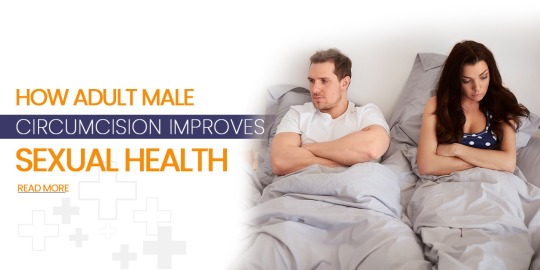
Adult male circumcision, the surgical removal of the foreskin from the penis, has been practiced for centuries for various reasons, including religious, cultural, and medical purposes. Beyond its traditional significance, research has increasingly highlighted the potential benefits of adult male circumcision for sexual health. In this article, we’ll explore the evidence-backed ways in which adult male circumcision can enhance sexual health and well-being.
Reduced Risk of Sexually Transmitted Infections (STIs):
One of the most compelling reasons cited for adult male circumcision is its role in reducing the risk of sexually transmitted infections (STIs), including HIV. Numerous studies have demonstrated that circumcised men are at lower risk of acquiring HIV, herpes simplex virus (HSV), human papillomavirus (HPV), and other STIs compared to uncircumcised men. This is believed to be due to the decreased surface area and moist environment under the foreskin, which can facilitate the transmission and replication of pathogens.
Lower Risk of Penile Cancer:
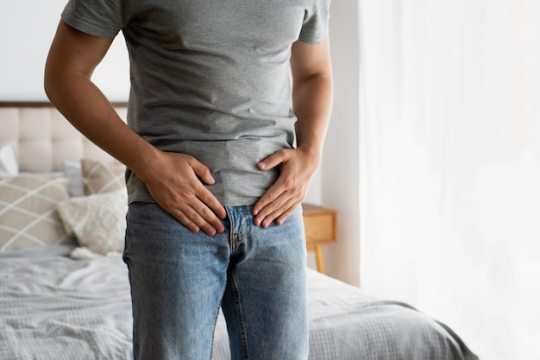
Adult male circumcision has also been associated with a reduced risk of penile cancer, a rare but serious condition that affects the tissues of the penis. The removal of the foreskin eliminates the moist and bacteria-prone environment that may contribute to the development of penile cancer. While penile cancer is relatively rare, circumcision offers a preventive measure that can lower the risk of this disease.
Improved Hygiene:
The removal of the foreskin through adult male circumcision simplifies genital hygiene and may reduce the risk of certain infections and irritations. Without the foreskin, it’s easier to clean the penis, as there are no folds or creases where bacteria and debris can accumulate. This improved hygiene can contribute to overall genital health and comfort, reducing the likelihood of unpleasant odors or infections.
Enhanced Sexual Satisfaction:
Some studies suggest that adult male circumcision may lead to increased sexual satisfaction and pleasure for both men and their partners. This is thought to be related to changes in penile sensitivity and sensation following circumcision. While individual experiences may vary, some men report heightened sexual sensitivity and improved erectile function after undergoing circumcision, which can positively impact sexual satisfaction and intimacy.
Reduction in Foreskin-Related Issues:
Uncircumcised men may experience foreskin-related issues such as phimosis (tight foreskin), paraphimosis (inability to retract the foreskin), or recurrent infections. Adult male circumcision can alleviate these problems by removing the foreskin entirely, eliminating the need for ongoing treatment or management of foreskin-related conditions. This can lead to improved genital comfort and function, enhancing overall sexual health and well-being.
Psychological Benefits:
In addition to the physical benefits, adult male circumcision may have psychological benefits for some individuals. For men who choose circumcision for personal or cultural reasons, undergoing the procedure can bring a sense of empowerment, confidence, and cultural identity. Feeling more comfortable and confident in one’s body can positively influence sexual self-esteem and relationships.
Conclusion:
Adult male circumcision offers several potential benefits for sexual health, including reduced risk of STIs, lower risk of penile cancer, improved hygiene, enhanced sexual satisfaction, resolution of foreskin-related issues, and psychological well-being. However, it’s important to note that circumcision is a personal decision, and individual experiences and preferences may vary. Before considering circumcision, it’s essential to consult with a healthcare provider to discuss the potential risks, benefits, and implications of the procedure. Ultimately, the decision to undergo adult male circumcision should be informed by careful consideration of one’s health, cultural beliefs, and personal preferences.
2 notes
·
View notes
Text
This may well be the most unpopular thing I've ever said on here but I dont think its accurate to say that monkeypox is the new AIDS and that information pertaining to spreading through sex or being particularly prominent in gay and bisexual men is all a massive hoax to spread homophobia.
For a start a lot of this research is relatively new so there is conflicting information amongst even the experts, but a lot of people on here seem to have simply decided that it can actually be spread through contact even through surfaces someone else has touched with some claiming it is airborne. Generally speaking, it is not understood as airborne, as with most illnesses, it can spread through droplets in face to face contact but does not linger in the air. It is most often spread through "close personal contact" which obviously means most cases have been spread through sex. No, it is not an STD in the traditional sense, but about 95% of cases were transmitted through sex. You can catch it through surfaces, but mostly things like sharing bedsheets or towels i.e. once again pertaining to more intimate relations.
Another common idea is that it is simple fact that gay men are just more likely to get tested due to being more cautious as a result of the AIDS crisis. But this has been considered by researchers - it is quite unlikely that "ascertainment bias" is solely responsible for the statistically high infections in gay and bisexual men, as lots of people have very significant symptons that would not be overlooked by the person, and would probably even require hospitalisation. A majority of researchers have been fairly clear that it is mostly a coincidence that it has spread though gay and bi men first (key word, first, not exclusively) - as it spreads through close contact gay and bisexual men are simply at higher risk because they are having intimate relations with each other.
I also want to point out that a lot of the focus on gay and bi men has been in the interest of actually helping people avoid and recover from the illness - for instance men who have sex with men have been prioritised for vaccines in many places, this is not just about homophobia, and in fact not very similar to the treament of aids at all.
Now, there is no doubt that the discussion of monkeypox has been repeatedly homophobic in many instances, and yes of course that makes it hard to trust anything, but that does not mean every tumblr user is an expert and it doesnt mean there is no correlation with same sex relationships.

(From this source.) This is basically the crux of it - we cannot and should not simply ignore research about monkeypox, or any other illness for fear of how it might be perceived. As Owen Jones (a gay man and political activist) points out in his article: Saying monkeypox is tearing through communities of queer men isn’t stigmatising – being afraid to say it is, "the problem with the HIV/Aids response wasn’t that it was targeted, it’s that it was stigmatised. In the west, this is an illness that has always overwhelmingly disproportionately affected men who have sex with men." Some diseases will indeed affect communities more than others, and/or at different times to others, to suggest that they won't is unhelpful, and leaves people vulnerable where they should be more supported.
16 notes
·
View notes
Text
I have a pt in Descovy for PrEP. Their website has all the info you should know about how to monitor for adverse effects on this medication.
What is DESCOVY for PrEP?
DESCOVY for PrEP (pre-exposure prophylaxis) is a once-daily prescription medicine for adults and adolescents at risk of HIV. It helps lower the chances of getting HIV through sex.
DESCOVY for PrEP is not for everyone:
It is not for use in people assigned female at birth who are at risk of getting HIV from vaginal sex, because its effectiveness has not been studied.
You must be HIV-negative before and while taking DESCOVY for PrEP. Talk to a healthcare provider to see if DESCOVY for PrEP may be an option for you.
Important Safety Information
What is the most important information I should know about DESCOVY for PrEP?
Before and while taking DESCOVY for PrEP:
You must be HIV-negative before you start and while taking DESCOVY for PrEP. You must get tested for HIV-1 immediately before and at least every 3 months while taking DESCOVY. If you think you were exposed to HIV-1, tell your healthcare provider right away. They may want to do more tests to confirm that you are still HIV-negative.
Many HIV-1 tests can miss HIV-1 infection in a person who has recently become infected. Tell your healthcare provider if you had a flu-like illness within the last month before starting or while taking DESCOVY. Symptoms of new HIV-1 infection include tiredness, fever, joint or muscle aches, headache, sore throat, vomiting, diarrhea, rash, night sweats, and/or enlarged lymph nodes in the neck or groin.
DESCOVY by itself is not a complete treatment for HIV-1. Do not take DESCOVY for PrEP unless you are confirmed to be HIV-1 negative.
DESCOVY does not prevent other sexually transmitted infections (STIs). Practice safer sex by using a latex or polyurethane condom to reduce the risk of getting STIs.
To further help reduce your risk of getting HIV-1:
Do not miss any doses of DESCOVY. Missing doses may increase your risk of getting HIV-1.
Know your HIV status and the HIV status of your partners. If your partner is living with HIV, your risk of getting HIV is lower if your partner consistently takes HIV treatment every day.
Get tested for other STIs. Some STIs make it easier for HIV-1 to infect you.
Talk to your healthcare provider about all the ways to help reduce HIV risk.
DESCOVY can cause serious side effects:
Worsening of hepatitis B (HBV) infection. Your healthcare provider will test you for HBV. If you have HBV and stop taking DESCOVY, your HBV may suddenly get worse. Do not stop taking DESCOVY without first talking to your healthcare provider, as they will need to check your health or give you HBV medicine.
Who should not take DESCOVY for PrEP?
Do not take DESCOVY for PrEP if you:
Already have HIV-1 or if you do not know your HIV-1 status. If you have HIV-1, you need to take other medicines with DESCOVY to treat HIV-1. If you have HIV-1 and take only DESCOVY, your HIV-1 may become harder to treat now and in the future.
What are the other possible side effects of DESCOVY for PrEP?
Serious side effects of DESCOVY may also include:
Kidney problems, including kidney failure. Your healthcare provider should do blood and urine tests to check your kidneys before and during treatment with DESCOVY. If you develop kidney problems, your healthcare provider may tell you to stop taking DESCOVY.
Too much lactic acid in your blood (lactic acidosis), which is a serious but rare medical emergency that can lead to death. Tell your healthcare provider right away if you get these symptoms: weakness or being more tired than usual, unusual muscle pain, being short of breath or fast breathing, stomach pain with nausea and vomiting, cold or blue hands and feet, feel dizzy or lightheaded, or a fast or abnormal heartbeat.
Severe liver problems, which in rare cases can lead to death. Tell your healthcare provider right away if you get these symptoms: skin or the white part of your eyes turns yellow, dark "tea-colored" urine, light-colored stools, loss of appetite for several days or longer, nausea, or stomach-area pain.
Common side effects in people taking DESCOVY for PrEP are diarrhea, nausea, headache, fatigue, and stomach pain. Tell your healthcare provider if you have any side effects that bother you or do not go away.
What should I tell my healthcare provider before taking DESCOVY for PrEP? All your health problems. Be sure to tell your healthcare provider if you have or have had any kidney or liver problems, including hepatitis. All the medicines you take, including prescription and over-the-counter medicines, vitamins, and herbal supplements. DESCOVY may interact with other medicines. Keep a list of all your medicines and show it to your healthcare provider and pharmacist when you get a new medicine.v You are encouraged to report negative side effects of prescription drugs to the FDA. Visit www.fda.gov/medwatch, or call 1-800-FDA-1088.
What is DESCOVY for PrEP?
DESCOVY for PrEP (pre-exposure prophylaxis) is a once-daily prescription medicine for adults and adolescents at risk of HIV. It helps lower the chances of getting HIV through sex.
DESCOVY for PrEP is not for everyone:
It is not for use in people assigned female at birth who are at risk of getting HIV from vaginal sex, because its effectiveness has not been studied.
You must be HIV-negative before and while taking DESCOVY for PrEP. Talk to a healthcare provider to see if DESCOVY for PrEP may be an option for you.
2 notes
·
View notes
Text
Monkeypox.
It's time to start wearing gloves AND masks if you have to go into public.

If you recall, there was a lot of fear and uncertainty about how COVID could transmit at the start of the pandemic and one of the major rushes of PPE was gloves due to fear of fomites (objects touched by an infected person that now carry the virus and transmit it to other people). We later learned this is basically a non-issue with COVID -- just wash your hands before you start touching your face or eating and you're good to go, which was practical advice already.
However we already know exactly the avenues that monkeypox takes to infect, and one of the primary avenues of monkeypox transmission is by fomites -- food, shopping carts, countertops, chairs, toilets, doorknobs, credit cards, cash/coins, even dare I say public or shared laundry machines unless you use a disinfectant in your detergent that will kill it. What's more, monkeypox is not killed by sunlight and sticks around on surfaces for upwards of eighteen months.
[IMPORTANT EDIT: some virologists are suggesting that ordinary detergent is fine if you both wash and dry on high heat; others are saying if you wanna be safe then use Oxyclean or something similar. And, obviously, please dear god don’t use me as a final source!]
I’ve seen and heard reports that say that infections typically occur from prolonged physical contact or some kind of open wounds (minor or otherwise). Also there’s a lot of fearmongering about this being another GRID, which is what a lot of people were calling HIV before they came to their senses and realized it wasn’t just affecting gay people; nevertheless, it’s definitely being passed through the gay community at a much higher frequency at the moment.
You do not show symptoms for upwards of a week and REMAIN INFECTIOUS for a full month. Symptoms typically start with a fever followed within a couple of days with blisters or a rash forming on the face and extremities, and occasionally on the eyes.
What can you expect if you actually get monkeypox? As with other true poxes (chickenpox is not actually a pox, it's herpes), you'll get a rash that has the potential to disfigure you that can appear all over your body, even in the nooks and crannies you didn't think it'd ever reach. The approximate fatality rate in nations where there have been outbreaks in the past is 3%.
Quoting the WHO:
Complications of monkeypox can include secondary infections, bronchopneumonia, sepsis, encephalitis, and infection of the cornea with ensuing loss of vision. The extent to which asymptomatic infection may occur is unknown.
We as a country have already stumbled HARD with monkeypox right out the gate. There's no containment protocols or quarantines going into effect, and no contact tracing, because everyone's afraid of the provable political backlash! What’s more, even though the CDC has plenty of information on monkeypox, people you call there apparently really don’t know what's going on and some people who answer phone calls at the CDC reportedly haven’t even heard of it. Physicians aren't being trained to recognize it and don't know when or how to test for it.
If you are younger than about 50, you should probably go get vaccinated because the odds you were never vaccinated against smallpox as a child is pretty high, and continue getting higher the younger you are.
This is because we no longer do global eradication campaigns for smallpox anymore cuz we already won that particular battle. [ANOTHER EDIT: Even if you are vaccinated, make sure it was within the past 18 years or you may need to get another vaccination, and as always don’t take my word as a final source, definitely talk to a professional]
3 notes
·
View notes
Text
Hey CNN how about a story mentioning the men spreading STIs?
Brett Coomer/Houston Chronicle/Getty ImagesCNN —
The Houston Health Department has reported a syphilis outbreak, with an increase of 128% among women in the city, and a ninefold increase in congenital cases in Houston and the surrounding Harris County area since 2019.
Rates of congenital syphilis are skyrocketing in the US. Here's why
Health officials announced the outbreak in a Thursday news release.
According to the department, new infections rose by 57% from 2019 to 2022. There were 2,905 new infections in 2022, compared to 1,845 new infections in 2019.
There were 674 cases among women in 2022, a steep increase from 295 cases in 2019, according to the release. And there were 151 cases of congenital syphilis in 2021, the latest year for which statistics are available, compared to just 16 cases in 2016.
Congenital syphilis happens when a pregnant person passes the bacterial infection to their baby in the womb. Untreated congenital syphilis can lead to stillbirth or damage the baby’s organs or bones.
“It is crucial for pregnant women to seek prenatal care and syphilis testing to protect themselves from an infection that could result in the deaths of their babies,” said Marlene McNeese Ward, deputy assistant director in the Houston Health department’s Bureau of HIV/STI and Viral Hepatitis Prevention, in the news release. “A pregnant woman needs to get tested for syphilis three times during her pregnancy.”
Pregnant women should be tested for syphilis at their initial prenatal visit, during the third trimester, and at delivery, according to the release.
The health department is waiving all clinical fees for sexually transmitted infections at its health centers, according to the release.
Additionally, the department “will expand the use of its HIV/STD mobile clinic to increase the number of community screening sites and set up in areas considered hot spots, selected from disease monitoring and case management data,” the release said.
Syphilis is a bacterial infection commonly spread through sexual contact. The disease usually starts with a painless sore on the genitals or mouth – direct contact with the sores spreads the infection.
When it’s caught early on, syphilis is easily treatable with antibiotics. But without treatment, the infection can lie dormant in the body for years or even decades before attacking the brain, nerves, eyes, and other organs. It can cause deafness, blindness, and death.
Congenital syphilis has skyrocketed across the US, particularly in the South and Southwest. Infections in newborns have risen about 700% across the country over the past decade, a CDC official previously told CNN. Experts attributed the rise to a combination of factors including lack of public funding for sexual health programs, a shortage of qualified personnel, and uneven coverage for screening by Medicaid.
Because syphilis in its early stages may not have obvious symptoms, pregnant people and their health care providers might not notice it or screen for it at all.
#CNN#Women don't catch STIs by themselves#Houston#Texas#Are they even trying to collect the names of men they slept with?
15 notes
·
View notes
Text
How to Talk About Getting Tested for STIs Before Sex

By Robyn Bell
Discussing STI testing before sex can feel awkward, but it's important to normalize this conversation. While we often talk about preventing pregnancy, protecting ourselves from sexually transmitted infections (STIs) is equally crucial. Here’s how to address STI status effectively.
What Are STIs?
Sexually transmitted infections (STIs) are common, especially among young people in the UK. Anyone can contract an STI, regardless of sexual history, orientation, gender identity, or type of sexual activity. However, you can take control and protect yourself.
Using Condoms and Dental Dams
Condoms and dental dams are excellent barriers that prevent STI transmission. When used correctly, condoms are 99% effective at preventing pregnancy and some STIs.
Protecting Against All STIs
Unfortunately, some STIs, such as genital herpes, genital warts, and syphilis, can be transmitted through skin-to-skin contact. Even with condom use, it's possible to contract these infections. For effective protection, you must communicate openly about STI status before sexual activity.
Knowing Your STI Status
Get tested to know your STI status. Chlamydia and gonorrhoea can be tested through a urine sample or vaginal swab, which you can do yourself. HIV and syphilis require a blood test, available at sexual health clinics or through postal kits in some areas. Find your nearest service here or use SH:24 for free postal testing.
A negative result is usually communicated via text, while a positive result will prompt a call from a nurse to arrange treatment. Most STIs can be treated with antibiotics.
Starting the Conversation
To discuss STI status with a partner, you can use messaging if it's more comfortable. For example:
"My last STI test was [date], and I am [positive/negative] for [insert STIs]. How about you?"
If you have a positive result for a treatable but not curable STI, like herpes, share helpful resources and offer to answer questions:
"I have [herpes], and I know you might need some time to think about what that means. Here are some resources that helped me. Feel free to ask any questions."
People with non-curable STIs can still have healthy sexual relationships. Check out this Instagram account for more insights.
Talking About Sex
It's normal to feel shy about these conversations since our culture often shames discussions about sex. Films and pornography rarely show conversations about STI status and consent. However, you can normalize this in your own sex life. If someone refuses to discuss their STI status or insists they "just know" they're clear without testing, it’s a red flag. They may need time to adjust, but your health and safety deserve priority.
Additional Support
Where to get a sexual health check in the UK
Brook – Free STI home testing kits
Brook – STIs and stigma
0 notes
Text
Is It Possible to Get an STD from Kissing?
How STDs are spread
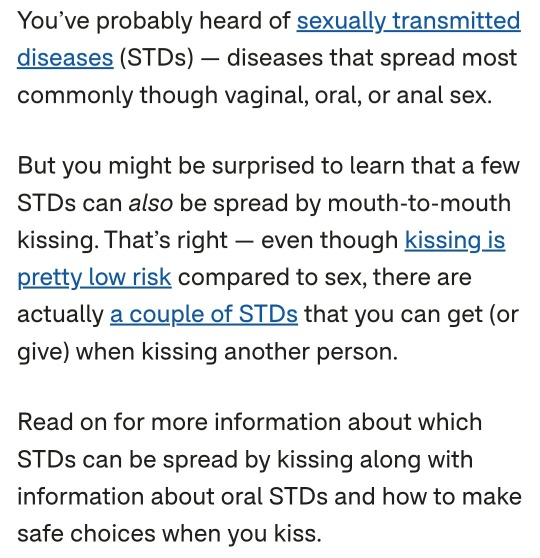
Small microorganisms (germs) can cause STDs. Some of these microorganisms can live in your saliva, or they can cause sores in your mouth. This makes it easier for them to spread between people when they kiss, especially during deep, open-mouthed kissing.
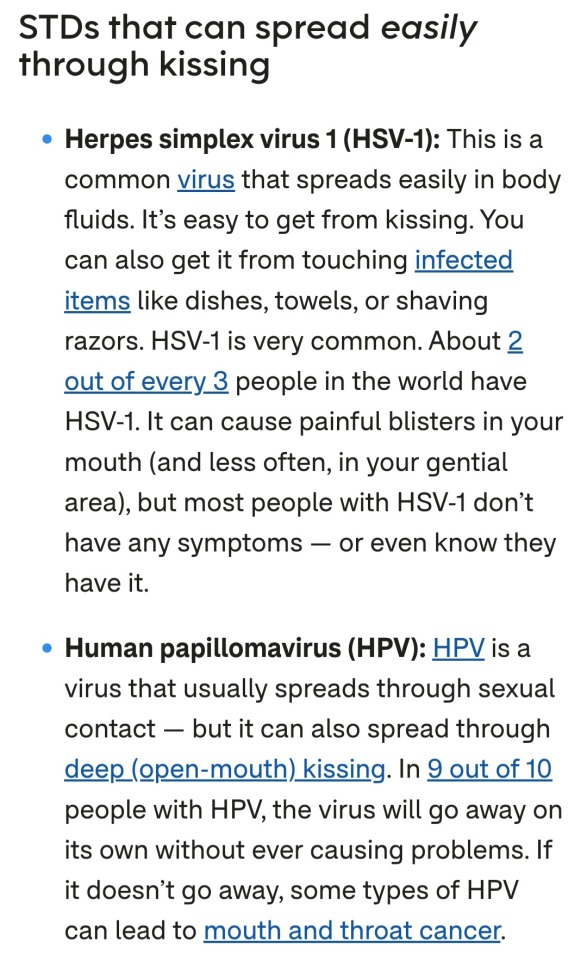
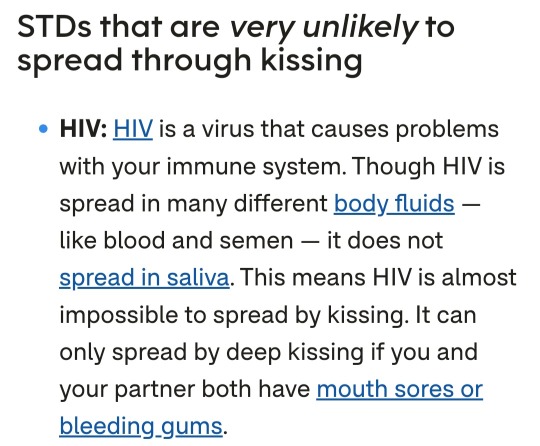
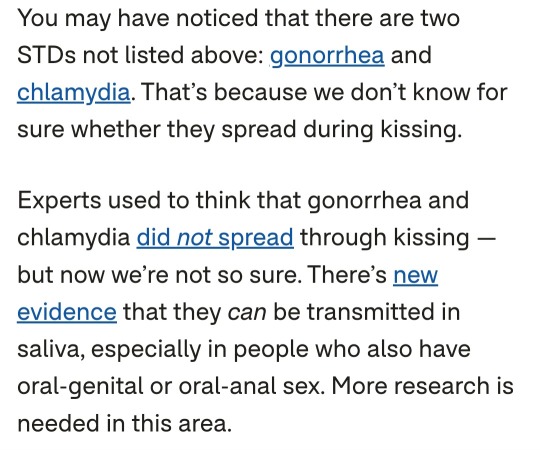
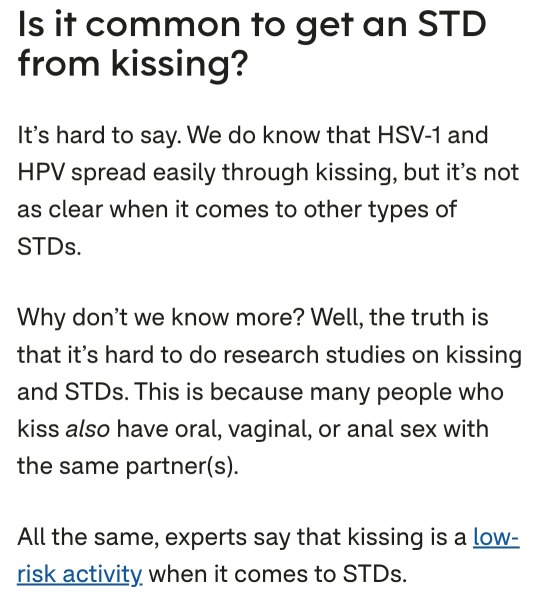
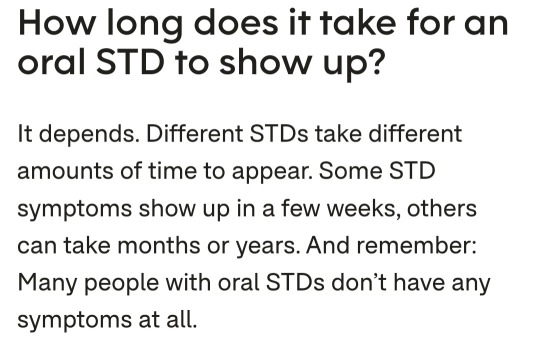
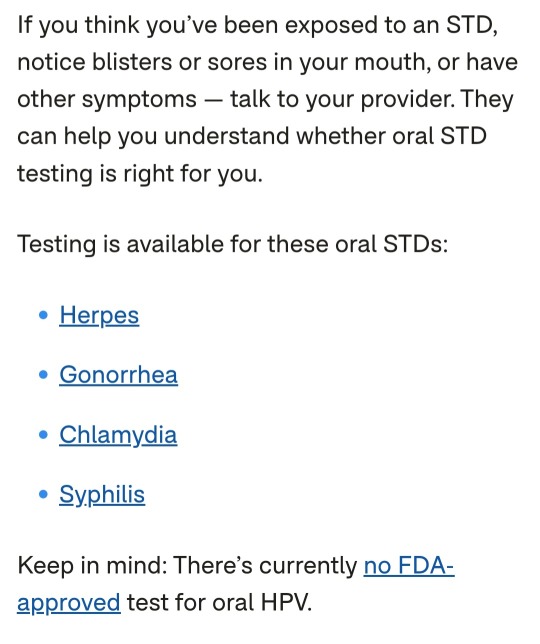
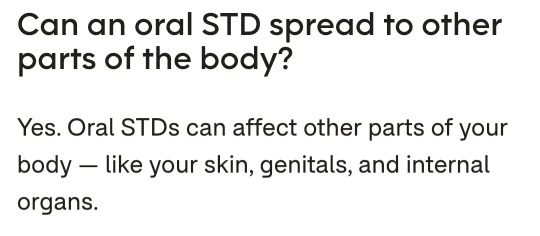
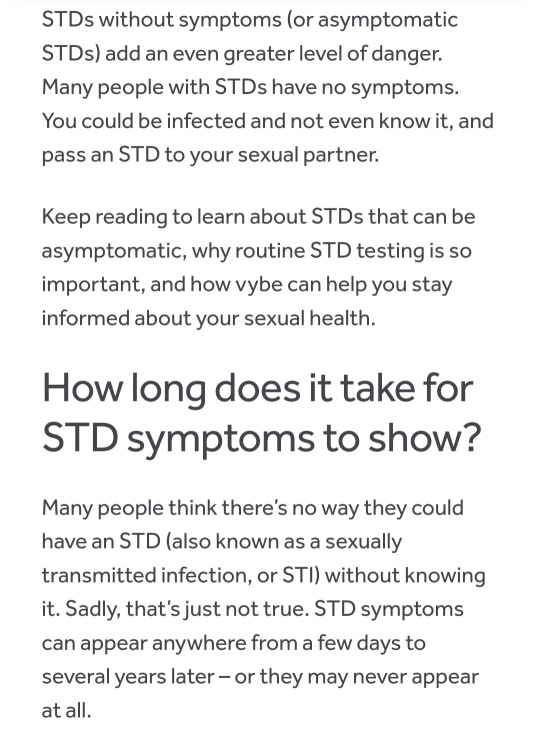
Some STI's cause no symptoms or only mild symptoms. But even with no symptoms, STI's can spread to others. Testing is the only way to be sure you have an STI.
Consider this: about 50% of men and 70% of women infected with Chlamydia, one of the most common STDs, have no symptoms at all. Zero.
The belief that you can tell if someone has an STD by symptoms alone is one of many myths responsible for today's surging STD rates. Yes, there are potential signs of STDs in males and females you should watch for (such as unusual sores, bad-smelling discharge, pain or burning when urinating, or bleeding between periods). However, you should never assume that lacking these symptoms means you're all clear.
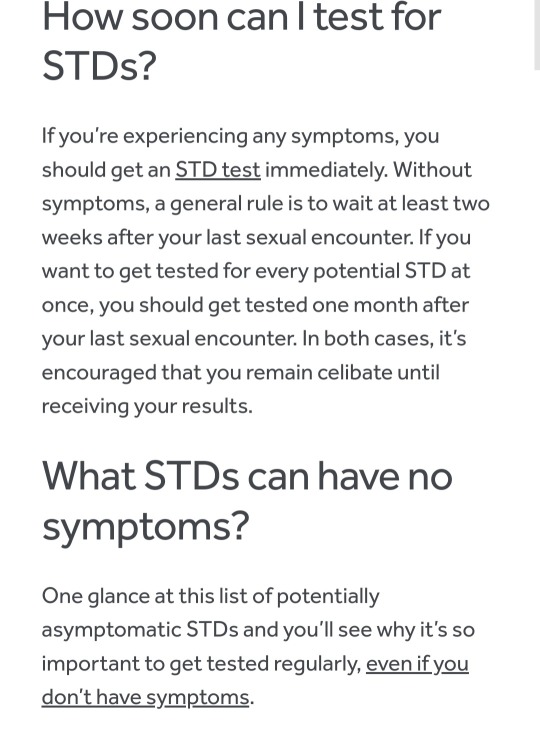
These STD's include Chlamydia, Gonorrhea, HIV, Herpes, Trichomoniasis, HPV, and Hepatitis B.
This is why it's good to get tested with your partner before sexual contact (due to many stds that are asymptomatic).
Also, while most STI's are transmitted through blood, vaginal secretions and semen, there are some that can also be contracted via contact with saliva.
For example, herpes simplex virus (the most common cause of cold sores) can be transmitted via kissing as well as oral. Gonorrhea, and less commonly, Chlamydia, can also be spread via kissing and oral. Importantly, all of these organisms can cause asymptomatic infection, so they can spread before the person is aware they are infected.
0 notes
Text
How to cure Urinary Tract Infection Naturally?
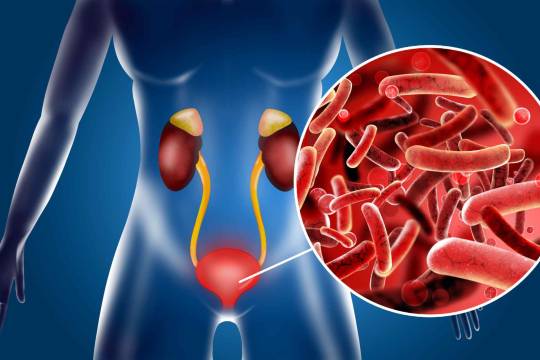
What is Urinary tract Infection?
Urinary system consists of parts such as kidney, ureters, bladder and urethra. Urinary tract infection is the infection of urinary tract. Usually the parts of the system that are infected in urinary tract infection are bladder and urethra but it can involve bladder and kidney. If infection is limited to urethra than it is called as urethritis, if kidneys are involved it is called as pyelonephritis and if bladder is involved it is described as cystitis. Women are more prone to infections than men due to their anatomically smaller length of urethra.
Normally, urine is the byproduct of the kidney which contains excess water along with waste product and toxins removed from the blood. Usually the urine when moving through urinary system does not contain any contamination. It caught infection from outside the body causing infection and inflammation known as urinary tract infection.
Types of UTI:
Vaginitis: It is a vaginal infection
Urethritis: Infection of urethra causing discharge and burning sensation during urination
Cystitis: Bacterial infection spreads to bladder which gives symptoms like pain during urination, reoccurring need to urinate, lower belly pain, cloudy or bloody urine.
Pyelonephritis: When the infection ascends towards kidneys. The severity of the UTI increases as a result of this person have fever with chills, vomiting , nausea, pain abdomen
What causes Urinary tract Infection:
Various microorganisms can lead to UTI usually bacterial. Bacteria such as E.coli, chlamydia, mycoplasma are responsible for urinary tract infection in both male and females. Chlamydia and mycoplasma usually transmits through sexual activity. Men have longer urethra than women that is why women are more at risk.
Women whose mother has frequent history of UTI
Poor genital hygiene
People with diabetes, HIV attracts more infection
Women using spermicides, diaphragm, condoms during intercourse
Women using lubricants to prevent dryness during intercourse
Increased sexual activity
Older people usually get UTI due to catheterisation or prostatitis
Sexually transmitted disease might cause the infection
Weak immune system
Some complications like menopause, spinal injury
Using public toilets
What are the symptoms?
Persistent or instant urge to urinate after shorter period of time
Increased urine frequency
Urine is cloudy, bloody or foul smelly
Fever with chills
burning micturition
vomiting and nausea
lower abdomen, flank or pelvic pain
pressure in lower abdomen or pelvis
Itching in vaginal area
Ayurveda view point over Urinary tract infection:
Ayurveda is a science of holistic healing and it focuses on doshas (Vata, Pitta and Kapha) the three energies of the body. These bodily energies should be in balanced state for a good health. When the doshas are imbalance it leads to diseases. Urinary tract infection is due to the vitiation of all three dosha predominantly pitta dosha. It is mutravaha srotas vyadhi.
Preventions for UTI:
Maintaining good hygiene
Drinking a lot of water
Avoid spicy food
Including probiotics such as curd
Avoid using birth controls like condoms etc
Drinking plenty of fluid like coconut water
Proper urination
Maintaining gut health, avoid eating processed food
Avoiding foods that causes UTI
Drinking tea or coffee
Eating cranberries since it contains proanthocyanidins that prevents the bacteria from sticking to the walls of baldder.
Some potent Herbs For Urinary Tract Infection:
Varuna (Crataeva nurvala): It has anti-inflammatory and antioxidant properties which helps in treating urinary tract infection.it works by flushing out dangerous bacteria out of the body.
Punarnava (Boerhavia diffusa): It is well known Ayurveda herb for urinary infections. It heals urinary infections and has diuretic properties. It’s antimicrobial properties reduces the urinary tract irritation and flushes out the toxins out of the body.
Gokshur (Tribulus terrestris): It is an effective herb for Urinary tract Infection. It significantly relieves the symptoms like burning, itching, discomfort etc. It also have diuretic properties that corrects UTI by maintaining the urine flow.
Some classical Ayurvedic formulation for UTI:
Chandraprabha vati
Varunadi kwath
Punarnavadi kwath
Chandanasava
Guduchi ghan vati
Prval pisti
Tandulodaka (rice water)
Managing Urinary Tract Infection with Chandigarh Ayurved Centre:
Chandigarh Ayurved centre provides you the best natural and herbal remedy “Urinary tract infection (UTI) care kit” which cures the disease in a natural way. It mainly affects the root cause of the disease and helps in curing the disease. The continuous use of this kit shows a proven result.
ALL PRODUCTS DESCRIPTION IN DETAIL:
Liver Care Tablet
The Liver care tablet of CAC is a herbo mineral pure ayurvedic formulation. It mainly works in balancing pitta doshas. liver care tablet consists of ingredients like Kalmegh (Andrographis paniculata), Kutaki(Picrorhiza kurroa), Bhumi amla( Phyllanthus niruri), Giloy(Tinospora Cordifolia), Yavakshar( Hordeum vulgare), Imli Kshar( Tamarindus indica), Mukta Shukta pisti etc. Its main function is to improve the circulation of blood. it works against burning sensation of urine, removes urinary infection and other inflammatory conditions.
Dosage: Take one tablet twice daily with plain water after a meal.
UTI Care Tablet
It’s a 650 mg pure herbo mineral ayurvedic formulation. it treats the root cause of diseases without any side effects. along with the UTI problem it also treats problems related to kidney, urinary bladder, urethra and ureters. it consists of ingredients like Yavakshar (Hordeum vulgare) -200 mg, Kalmi Shora (Potassium nitrate) -150 mg, Nuashadar (Ammonium chloride) -150 mg, Swarna Gairik (Red ochre) -150 mg. It removes the kidney stones, renal colic, painful micturition, hypertension, and burning sensation during the passage of urine. it has antioxidant and anti -inflammatory properties. also useful in dysuria, pelvic pain, urine incontinence, foul odor, etc.
Dosage: take 1 tablet twice daily with plain water after meal.
Trikatu Syrup
Trikatu syrup is pure ayurvedic formulation comprises of mainly three herbs such as Pippali (Piper longum), Shunthi (Zingiber officinale), & Marich (Piper nigrum). the main function of trikatu syrup is it removes excess of Kapha doshas and supports the respiratory system, help to reduce body weight and hence detoxifies the body. it has anti-inflammatory , analgesic and antioxidant properties. It boosts metabolism and works in dysuria, painful micturition, and reduce inflammation of the kidney occurs due to any diseases. It is free from chemicals, additives, colors and fillers.
Dosage: 2 tsp twice daily before a meal.
Detox Premium Powder
It is purely a herbal formulation that helps to reduce inflammation and burning sensation caused due to UTI infection. It has an anti-inflammatory action. It also helps to remove toxins due to its antioxidant properties. It comprises of Moti Pishti, Parwal Pishti, Shukta Pishti, Giloy Satav, Kamdudha Ras, Jahar Mohra, Akik Pishti, Gandhak Rasayan, Shankh Bhasma, Sutshekhar Ras, Sudhyog Tab, Shwet Parpati, Yavakshaar. It has an antibacterial action and provides cooling and calming effect to the body.
Dosage: Take one sachet twice a day with normal plain water.
Sheet dhara:
It is pure herbo mineral ayurvedic formulation which works on doshas of the body especially pitta doshas. It mainly consists of herbs like Ajwaion, Kapur (camphor) and Mint leaves that provide a cooling effect and helps to reduce burning sensation during micturition. it also controls mood swings, bloating and nausea.
Dosage: Take 1/2 or 1 teaspoon of sheet dhara twice daily empty stomach.
0 notes
Text
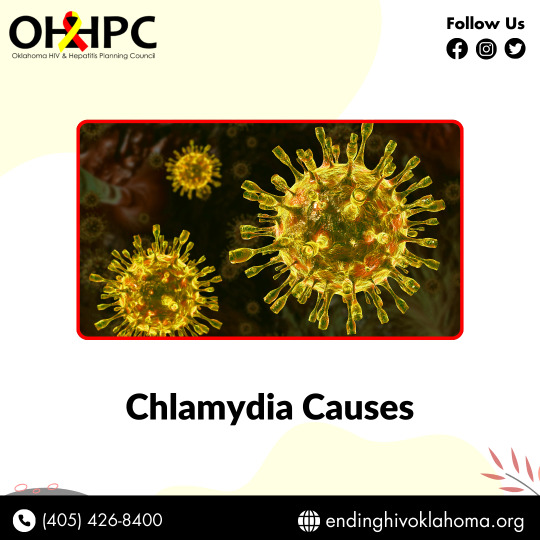
Chlamydia Causes
Understanding the Chlamydia Causes is pivotal in promoting sexual health. In Oklahoma, awareness of how this infection is primarily transmitted through unprotected sexual contact with an infected person is crucial. Ending HIV, available at (405) 426-8400, provides comprehensive education and resources on Chlamydia prevention. Whether through vaginal, anal, or oral sex, knowing the risks empowers individuals to make informed choices and take proactive measures. By addressing the root causes and promoting safe practices, we can work towards reducing the prevalence of Chlamydia and enhancing overall well-being in our communities.
0 notes
Text
Effectiveness of condoms against STDs
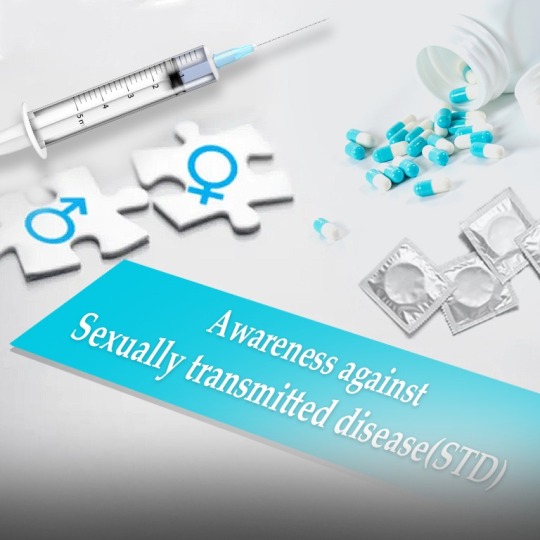
One of the most conventional and solid types of conception prevention is the condom. Condoms shield from physically communicated diseases, as opposed to other famous techniques for contraception, including oral prophylactic tablets and intercourse interruptus (withdrawal or take out strategy) (sexually transmitted diseases). The Middle for Infectious prevention and Anticipation (CDC) expresses that customary and fitting condom use can bring down the gamble of sexually transmitted diseases like chlamydia, gonorrhea, trichomoniasis, and so on, and HIV transmission. Use Bombae condoms, one of the most outstanding condoms for enduring in India, while looking for quality. Because of its rich uniqueness and arranged enhanced condoms, Bombae condoms are doing the best business.
Keeping away from dangerous sex or being in a serious relationship with a uninfected accomplice are the most effective ways to forestall having a sexually transmitted disease. More often than not, in any case, those contaminated know nothing about the sickness since sexually transmitted diseases can be asymptomatic and hard to analyze.
How well do extra-lubricated condoms attempt to forestall sexually transmitted diseases?
Condoms are a hindrance of protection against sexually transmitted diseases, which can spread by organic liquids like blood, vaginal liquid, and semen. Utilizing a condom, whether male or female, may prevent a tainted person from passing the contamination to their accomplice. They are basically more effective at forestalling sexually transmitted diseases like gonorrhea, chlamydia, trichomonas, hepatitis B, and HIV that spread from the male urethral opening. They can likewise assist with forestalling the spread of sexually transmitted diseases that are spread through the skin or mucous films, like herpes, syphilis, and human papillomavirus. Yet, make a point to wear condoms from the best condom brand in India.
Consider the possibility that sexually transmitted diseases are condoms not compelling against.
In spite of the fact that condoms essentially decrease the gamble of sexually transmitted diseases, they don't dispense with them. A few sexually transmitted diseases can in any case be created or spread regardless of whether a condom is utilized during sex. Skin-to-skin contact is another way that sexually transmitted diseases can spread. Subsequently, there is an extensive gamble of transmission of the infection or bacterium on the off chance that a contaminated area of skin that isn't covered by a condom connects with your accomplice's uncovered skin during the demonstration. Condoms offer less insurance from a few of the most well-known diseases as of late, including the herpes simplex infection (HSV) and human papillomavirus (HPV). Wear Bombae condoms, which are extra greased up condoms, to feel pleasurable, appreciate sex with various positions, and diminish the gamble of sexually transmitted diseases.
A portion of the sexually transmitted diseases that can spread even subsequent to wearing condoms are: best condom in India
Human papillomavirus (HPV) disease
Genital herpes
Syphilis
Pubic lice
Chancroid
How might condoms at any point be utilized to stop sexually transmitted diseases?
Condoms should be utilized fittingly and consistently to give the best security against sexually transmitted diseases. It is because of the expanded gamble of transmission with a tainted accomplice brought about by unpredictable use or not utilizing a condom, even a solitary sexual experience. The ill-advised utilization of condoms brings about breakage, slippage, or spilling, which decreases the defensive capability. Moreover, in the event that a condom isn't utilized during the whole sexual demonstration, from start to finish, the condom may not be compelling in forestalling sexually transmitted diseases.
Moreover, it's urgent to never reuse a condom and to continuously utilize another one. Stop the demonstration and change the condom assuming it tears in the center to diminish the opportunity of contamination transmission. Use alert while taking care of the condom to keep harm from teeth, fingernails, or other sharp things. In spite of the fact that condoms are not 100 percent protected and successful at forestalling sexually transmitted diseases, utilizing them accurately is fundamental. Use Bombae condoms to encounter satisfaction with no aggravation or secondary effects.
What to do on the off chance that your accomplice declines to wear condoms?
While safeguarding yourself from sexually transmitted diseases, correspondence with your sexual accomplice is fundamental. For what reason does your accomplice not have any desire to utilize a condom? Let your darling know how you feel about it and what outcomes unprotected sex can acquire your life. Utilize extra greased up condoms to appreciate and feel the most while closeness like Bombae condoms has the most slender condoms.
Try not to permit your accomplice to pressure you into renouncing assurance. In the event that you are uncertain of your accomplice's sexually transmitted disease status, you ought to get tried for sexually transmitted diseases together prior to keeping a sexual relationship. It forestalls the spread of sexually transmitted diseases.
0 notes